Here are some quick, fun, and easy christian games for adults that you can use to build fellowship and friendship. Use them in your churches Sunday gathering, small groups, or youth meetings.
🌟 Great news! Join our new WhatsApp Faith Community and start your day with uplifting Bible verses, encouragement, and hope. 💖
👉 Tap here to join Bibliaon Bible Daily now and be inspired daily!
1. Friendship Icebreaker: 'Follow the Master' game
Aim: To promote a playful atmosphere and increase group interaction.
Instructions: This is an imitation game based on 'Simon Says'.
Everyone has to follow the movements made by the master. Start by doing stretching movements: stretching your arms up and down, stretching your neck, squats, inserting dance moves, funny movements, etc.
Variation: The moderator of the activity can invite others in the group to be masters too (one at a time). Be careful to invite people who are confident and don't feel embarrassed being in front of the group.
Moral and biblical application: 1 Corinthians 11:1 ("Follow my example, as I follow the example of Christ...."). Can our attitudes be imitated by others? Understand the importance of being an imitator of Christ.
2. Friendship Icebreakers: Music and Dance
Aim: To get the participants to have fun while interacting and dancing together.
Materials: Music and choreography (prepare in advance). For example: Revolution - Kirk Franklin; Praise - Elevation Worship, This is Amazing Grace - Phil Wickham. You could use the song My Lighthouse - Rend Collective with the children; and Let Go - Hillsong Young & Free with young people.
Instructions: Get the members of your group grooving with a fun choreography!
- The facilitator will play the music and teach the moves, just a few at a time, building it up into a complete dance.
- Make sure the dance moves are easy to learn. Repeat them several times so that your group can remember them.
- If possible, teach two other people the complete choreography beforehand so they can help you at the front.
- At the end, put on the music so that everyone dances together.
Variation: The songs can be selected according to the theme or subject that has been chosen for that day.
Tip: Adapt the type of music and choreography to your audience.
Moral and biblical application: Psalm 150:6 ("Let everything that has breath praise the Lord....") God is worthy of all glory and praise! Giving praise to God with songs, with dances, with instruments, with our whole being is a great privilege.
3. A Fun Icebreaker: Follow the Leader's Commands
Aim: To promote an interactive fun atmosphere, encouraging the group to pay attention keeping to what is being asked.
Instructions: For this activity you'll need some space for people to move around in. Explain that everyone must follow the actions that the leader says, these are:
- Walk - Stop
- Clap - Name
- Dance - Jump
At hearing the command "Walk!", people should start walking from side to side, then when you say "Stop!" they should freeze on the stop. Then introduce the other commands: "Clap!" They should clap their hands; "Name!" they should shout out their name; "Dance!" they should dance in place and "Jump!" they should jump.
Variation: You can make it trickier by reversing the commands. For example, tell them that when you say "Name" - they should clap their hands and when you say "Clap" - they should say their name. You can add other more complicated commands too.
Moral and biblical application: Exodus 19:8; Deuteronomy 26:17-19 ("...you are to keep all his commands..."). Obedience to the commandments that God has given through the Holy Bible.
4. Getting Acquainted Activity: Memory Game (name and what you like)
Objective: To memorise names and things that the group members like. This activity is ideal for new groups or groups with new members.
Instructions:
- Position the participants in a circle so that everyone can see each other.
- Explain that each person will introduce themselves to the group by saying their name and one thing they really like to do, eat or someone they admire a lot, etc. (ask them to come up with something that hasn't already been said).
- Then the person next to them (on the right) will have to repeat the information they heard and add their name and what they like. And so on...
- For example: "He's so-and-so who likes to sleep a lot, she's Betty and likes chocolate, I'm Sam and I like the sea...".
- The last participant may be worried that they'll have to remember everyone before them, but you can then ask the first participant (who had very little to remember!) or, as the facilitator, you yourself can finish the activity by showing that you now know everyones name and something about each of them.
Variation 1: You could ask them to say something they don't like instead of what they like, or a quality that defines them, or a biblical character they like the most, a superhero they admire, etc.
Variation 2: If the group isn't very large, add another element to make the memory game a little more difficult. Do the normal sequence of participants, but have every third participant (6, 9, 12...) include "POI" (a 'Person Of Interest' from the Bible). So, every third participant (1, 2, 3-Pi, 4, 5, 6-Pi, 7, 8, 9-Pi...) must say, after their name and fact, a biblical character they like and a characteristic or quality. E.g.: "He's So-and-so who loves football, she's Beltrana who loves dancing, I'm Ciclano who loves studying and Pi is John the Baptist who ate locusts..."
Moral and biblical application: Matthew 20:16 ("So the last will be first, and the first will be last...."). Being first (gaining an initial advantage) is not always the best thing.
See also:
- 15 Super Fun Bible Games and Activities (For Adults And Children)
- Bible Quiz Game: Is it in the Bible? Questions And Answers
5. Group Building Activity: 'Beyond Face Value'
Aim: To encourage group building between participants in a relaxing and creative environment.
Materials: lively music, sheets of paper (A4 or half) and pens (colored pens, chalk or pencils, etc).
Instructions:
- Distribute a sheet of paper to each participant and ask them to write their name in a corner of the paper.
- Next, ask the participants to walk randomly around the room and stop when the music stops (or when the leader tells them to).
- At the signal to stop, they should swap pages with the person closest to them. This should happen 5 times.
- Ask them to draw: first the eyes, then the mouth, nose, ears, outline of the face and hair of the person whose name is on the sheet.
- Each time they stop, they should switch and draw only one part of the face. If people don't know each other, they should ask who the sheet belongs to before drawing. The drawing should not be shown to the "owner" until it is complete.
Variation 1: The person who starts the drawing, or the person who draws the eyes, should draw a self-portrait on the back of the sheet. As the music plays, people swap the sheets between them, so that it's no longer possible to tell who has drawn themselves. In the end, the owner of the sheet will have two images: their drawing done by 5 different people, but they will also have to find out whose self-portrait is on the back.

Variation 2: For groups of children, you could use the song "Head, shoulders, knees and toes" as they walk around the room. They can draw parts of their whole body during the game instead of just their face.
Moral and biblical application: 1 Samuel 16:7 ("... people look at the outward appearance, but the Lord looks at the heart....") God knows us right down to what is in our hearts, and he loves us deeply. This should be our model when showing love to others.
6. Activity to Get to Know Everyone Better: Human Bingo
Objective: To develop communication and interpersonal skills in a fun way.
Materials: Cards (drawn up in advance) and pens.
Card samples:
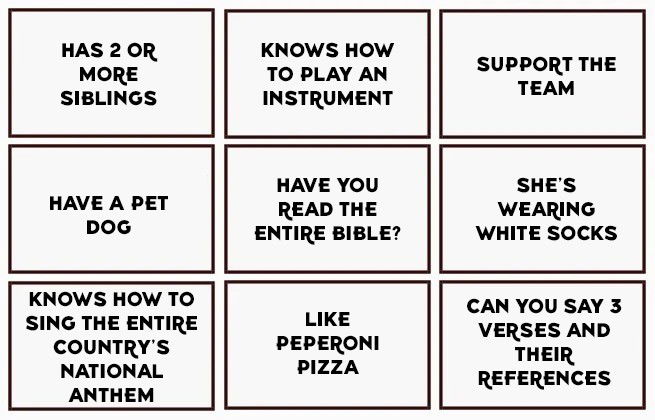
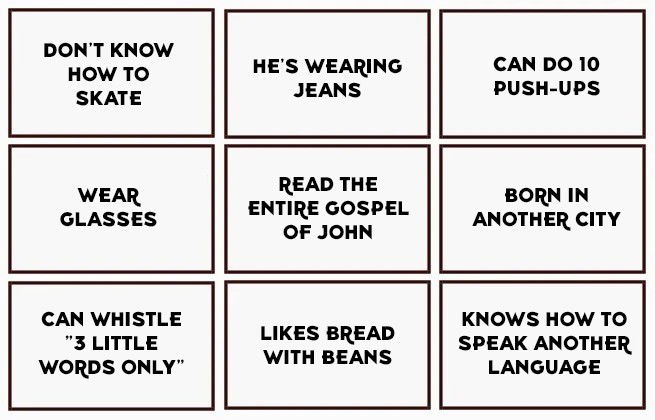
instructions:
- Distribute cards and pens among the participants (make sure each card is different, as in the samples above).
- On your signal, the group should ask each other questions and find people who match each item on the card as quickly as possible. There should be no repetition of names on the same card, nor should random names be used.
- The first person to fill in all the gaps shouts "BINGO!" and shows the card to the facilitator.
- If everything is in order, that person can be declared the winner.
- Check the winner's card by asking those named to confirm that the information is true. This could be turned into a game, for example, ask those who said they can sing the national anthem to prove it! Maybe those who can speak French to say a phrase or verse in French; those who can do push-ups to do one right there, etc.
Variation: You can also do fractional bingo. First, whoever fills in the vertical column says "Bingo!". Then the person who fills in the horizontal column and finally the person who has all the cards. This way, the game could have 3 different winners. Don't forget to confirm the information at the end so that more people can join in.
Tip: You could prepare a prize (gift, chocolate, lollipop) for the winner(s) of the game.
Moral and biblical application: Ephesians 4:25 ("Therefore each of you must put off falsehood and speak truthfully to your neighbor..."). Honesty pleases God. Talking with each other in truth, and sharing our lives together is something we need to do to build discipleship.
You may also like: 70 Hard Bible Quiz Questions With Answers.
7. Group Building Activity: Secret Message
Objective: To enable group members to share ideas and messages.
Materials: Sheets of paper, pens (pens, pencils, chalk, etc.), double-sided tape, or parcel tape.
Instructions:
- Give each participant a sheet of paper. Ask them to put their name in the top corner and return it to you.
- Attach the sheet to the person's back using crepe or double-sided tape. Ask 1 or 2 people to help you speed up the process.
- When everyone has their names pinned to their backs, hand out the pens.
- Ask them to write on each other's sheets (all of them or as many as possible, depending on the time available) a quality they appreciate in that person or a message or verse they want to share.
- In principle, the messages should be anonymous. At the end, each person can read the messages written by the group on their own sheet.
Moral and biblical application: 2nd Corinthians 3:2 ("You yourselves are our letter, written on our hearts, known and read by everyone."). Everyone reads our lives and gets to know who we really are...
8. Group Building Activity: Spoken Portrait
Aim: To encourage more interaction between group members, and help develop team listening skills.
Materials: Sheets of paper, pens (pens, pencils, chalk, etc.), table, boards or easels for painting/drawing.
Instructions:
- Prepare some unusual and/or random images, related or not to the theme addressed on the day.
- Divide the group into 2 or more teams (depending on the number of participants).
- Ask the groups to choose a sketch artist for their team. Give sheets of paper and pens to the sketch artist, who will stand with their back to the rest of the group, ready to draw.
- Hand out the images to the teams. The task is to describe the image to the sketch artist without letting him see it. Each team will have to strategise how best to do this.
- Set a time limit for the task. At the end, the team with the drawing most similar to the original image wins.
Variation: Instead of drawing, you could use Lego or coloured play dough to build a particular object or image. In this version, the artist will be the builder. They won't be able to see what they're going to build either, they'll just be guided by the group's hints.
Moral and biblical application: James 1:22 (Do not merely listen to the word, and so deceive yourselves. Do what it says). It's important to know how to listen more and speak less, above all to listen to and practise God's Word.
9. Team Building Activity: Ninja, Mouse and Bear game
Aim: To develop greater participation and relationships between the members of the group.
instructions: This game is a variation on "Rock, paper, scissors"
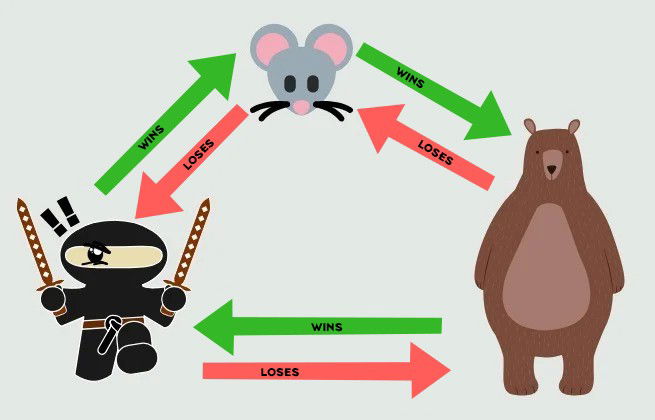
Character / Sound / Gesture
Ninja / Shouts - Hi-Yaaahh! / Makes a karate-style move.
Rat / Gives a high-pitched noise - SQUEEEAK! / Jumps up, arms folded forwards and fingers in front of the mouth, as if they were the rodent's teeth.
Bear / Screams - GRRRRRR! Jumps up, arms stretched upwards, like a huge bear.
- Invite pairs of participants to come forward. They should have their backs to each other.
- Demonstrate what each character should do before starting the game
- Agree on a signal to start the game: e.g. count to 3 and GO! Everyone has to turn round at exactly the same time.
- At the leader's signal (1, 2, 3, GO!) the participants must turn round, face each other and immediately make the sound and gesture of the chosen character.
Each pair will play 3 times. The best of the three attempts wins.
Variation: Divide the participants into 2 teams. The winner of the first team can compete against the winners of the other teams in a kind of championship. Play until there are only 2 winning participants left for the grand final between the teams. The "runners up" can play against each other for third prize, May the best win!
Tip: You could prepare a prize (Sweets, chocolate, lollipop) for the winner(s) of the game.
Moral and biblical application: Ecclesiastes 3:1-8 ("There is a time for everything, and a season for every activity under the heavens). Our role changes at different times in our lives. Our successfulness changes too. Only God remains constant.
10. Team Building Activity: Two Truths and a Lie
Aim: To enable personal sharing in a fun way and to address the issue of truth and lies.
Instructions:
- Arrange the participants in a circle so that everyone can see and be seen.
- Ask the participants to think of interesting events in their lives, strange things, likes, trips, etc.
- Each participant has to tell two truths and come up with a situation or taste that isn't true.
- Participants should think of unusual things so that there are doubts about the options they say. e.g. 1) I like to eat avocado with flour; 2) I've travelled on a transatlantic ship and 3) I have pink boots (others: I've fallen out of a lift, I've had a pet pig, I've read the whole Bible 3 times, I've almost stepped on a snake, I like to sleep sitting up, I can run 15 km in a row, I've read 30 books in a year, etc.)
The whole group will try to find out which are the truths and which are the lies. At the end, the participant will explain what the lie is.
Moral and biblical application: Acts 2:44 ("All the believers were together and had everything in common.") and Ephesians 4:25 ("Therefore each of you must put off falsehood and speak truthfully to your neighbor...."). It's important to be united with the family of faith, seeking to live in peace with one another. The second point is about lying: we follow the God who is Truth (John 14:6). When we live a life of lies, we are adopting another father (John 8:44).
11. Biblical Activities: Objects from the Bible
Objective: To develop memory skills and greater Knowledge of biblical passages.
Materials: Bibles (book is better than digital), paper, pens and a selection of objects that appear in the bible (e.g. stone, leaf, lamp, honey, sheet, bread, pot, stick, or other objects)
Instructions:
- Divide the everyone into two teams. Ask them to switch off their mobile phones. If possible, they should only consult a paper Bible.
- Invite a member of each group to randomly choose one of the objects on display (or hidden in a box or bag), until everyone has the same amount. E.g. 4 objects for one team and 4 for another.
- At the leader's signal, the groups should start looking for Bible verses that include the objects in their group.
- Set a time limit for the searches (5 or 10 minutes), and the groups should write down the verses on a sheet of paper.
- The team that finds the most verses wins.
Variation: Instead of having the objects, you could play the game using only the images of the objects on folded paper taken from a box.
Tip: You could prepare a prize (gift, chocolate, lollipop) for the winner(s) of the game.
Moral and biblical application: 2 Peter 3:18 ("But grow in the grace and knowledge...") As we read the bible we grow in knowledge of God's will and our role in his kingdom. A spiritual calling beyond the physical objects of this world.
12. A Bible Quiz
Objective: To enable greater understanding and learning of different biblical passages.
Materials: Bibles (preferably not digital), paper, pens.
Instructions: This is a Bible quiz game, so have Bible questions prepared with varying levels of difficulty, including some for children if you know they will be present.
- Divide the participants into 2 teams. You could let the groups choose names or colours to make them easier to identify.
- Ask the groups to choose 5 people (more or less) to answer the questions.
- Randomly number the chosen participants from 1 to 5. So number 1 from one group will be the opponent of number 1 from the other group, and so on.
- Draw lots among the pair as to who will start answering the questions.
- There will be two questions for each pair, one for each team. Attention: keep the level of difficulty the same for both opponents. It's not fair to ask group X an easy question and group Y a difficult one in the same round.
- When asking the questions, the leader should add:
- Answer or pass? - to the participant of the group drawn to start. They can answer or pass on the question to their opponent; (worth 3 points if they answer right here / wrong answers -1 point)
- Answer or pass back? - to the opponent, who can answer or, if they don't want to, they can pass it back to the other group; (worth 2 points / wrong answers -1 point)
- Answer or Pay? - the question goes back to the first participant, who then has to answer or pay (with a timed challenge). (worth 1 point, right answer or test completed / wrong answers -1 point)
Sample:
Questions:
- The boat was an important means of transport in biblical times. Name 3 biblical characters and share a fact about the stories they're from related to a BOAT.
- Women played a very important role in the biblical narrative. Name 3 women from the Old Testament and 3 women from the New Testament.
- The Bible teaches that we must abandon idolatry. In it we see the names of several false gods who became idols to God's people when people turned away from the Lord. Name three of these false deities.
- Light is an important theme throughout the Bible. Quote 4 verses that mention an instrument (object or star) that emits light. You could paraphrase or comment on the passage.
- The ass (or variations: donkey or colt) is an animal that appears in both the Old and New Testaments. Mention 3 characters and the passages in which this animal appears in the Bible.
Timed Challenges:
- Running test with a sack (line or rubbish bag type), on a circuit with obstacles.
- Balance test: spoon in mouth with boiled egg, walking with glasses of water on head (or mouth) to fill a bottle, human wheelbarrow, etc.
- General knowledge test - answer 5 questions on a separate sheet of paper
- General knowledge test - answer 5 questions on a separate sheet of paper
- Bible knowledge test - answer 5 Bible questions on a separate sheet of paper
- Talent test: give a presentation, sing, play an instrument, dance, mime, improvise, etc.
Tip: Prepare the question cards and tests for each round in advance. You could also prepare a prize (gift, chocolate, lollipop) for the winner(s) of the game.
Moral and biblical application: 2 Timothy 2:15 ("Do your best to present yourself to God as one approved, a worker who does not need to be ashamed and who correctly handles the word of truth."). God approves of those who know his word, those who have Gods laws written on their hearts.
13. Quiz Game: What's the verse?
Aim: To encourage greater understanding of the Bible and to help the group memorise passages from the bible.
Materials: Bibles (preferably not digital), paper, pens, projector or poster images
Instructions:
- Divide the participants into 2 groups. Hand out Bibles, paper and pens.
- Prepare sequences of images containing something found in a particular passage or verse. Invite 2 participants, one from each group. They will have to mime each of the images. The groups that figure it out win points.
- After the mime game, show the images to everyone (via projection, or drawn on paper or a board).
- The groups have to find the biblical references for each sequence of images.
- The team that finds the most verses wins.
Sample:
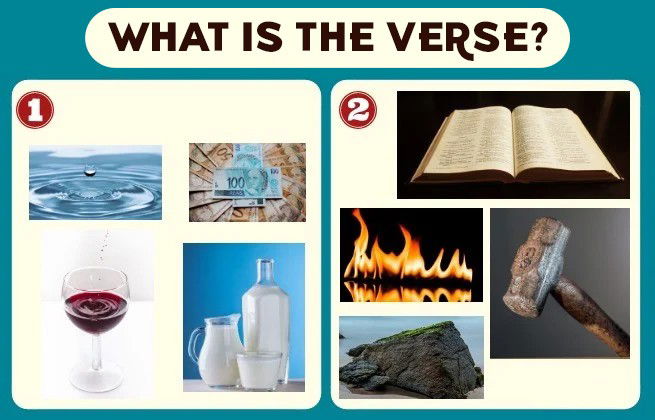
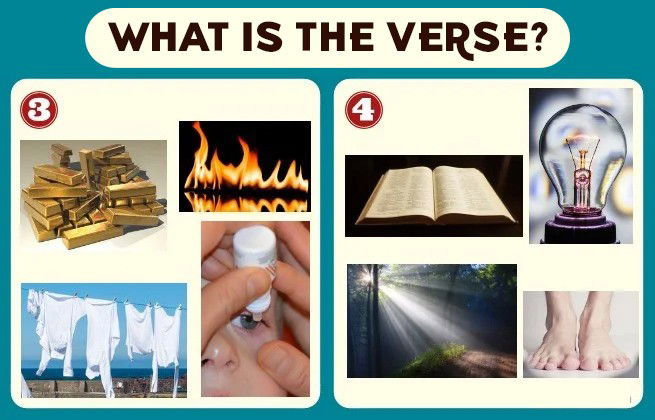
Answers: 1) Isaiah 55:1; 2) Jeremiah 23:29; 3) Revelation 3:18; 4) Psalm 119:105
Tip: Prepare the images in advance. You could also prepare a prize (gift, chocolate, lollipop) for the winner(s) of the game.
Variation: Which story? For groups of children, you could just show pictures that represent Bible stories and ask them to find out which story it refers to.
Moral and biblical application: Collosians 3:16 ("Let the message of Christ dwell among you richly....") It is important read the Bible and know it more and more deeply.
Want a different kind of challenge? Try these: 31 Fun Bible Riddles With Answer
14. Biblical Game: What's the Animal?
Objective: To encourage the group to read the Bible more and improve memorisation of Bible passages.
Materials: Bibles (preferably not digital), paper, pens
Instructions:
- Divide the participants into 2 or more groups. Hand out bibles, paper and pens.
- Explain that each group will receive lists containing biblical passages or themes, that relate to an animal. They will have to find out which animals are in these topics.
- Hand out the list(s). The groups have to find out which animals are on each topic on the list.
- The team that finds the most animals in the shortest time or finds them all first wins.
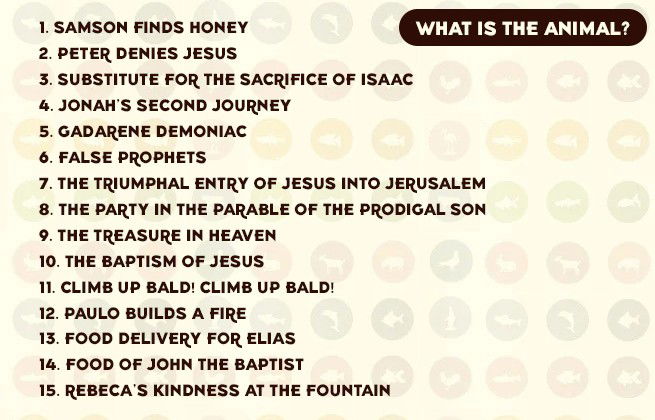
Tip: Prepare the lists with the references in advance. Also prepare a prize (toast, chocolate, lollipop) for the winner(s) of the game.
Variation 1: Name The Event/Character? This time, give out the animals (projection, pieces of paper with names or pictures) and the groups have to relate them to biblical passages or characters:
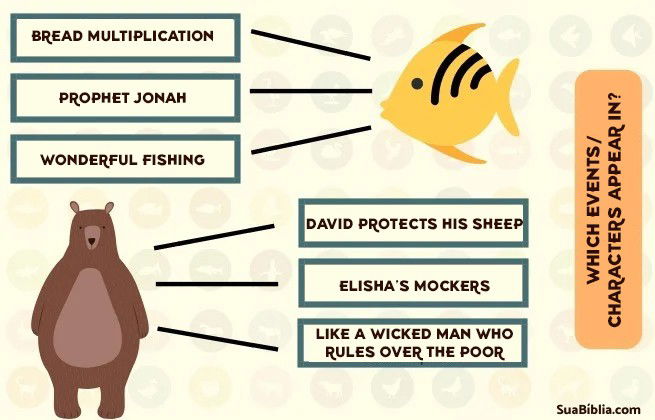
Variation 2: In both cases, you could ask the groups to also find the biblical references for each item.
Moral and biblical application: Hosea 6:3 ("Let us acknowledge the Lord;
let us press on to acknowledge him....") It's important to seek to know the Bible more and more deeply.
Answers: 1. lion (Judges 14:8); 2. rooster (John 18:27 and others); 3. ram (Genesis 22:13); 4. great fish/whale (Jonah 1:17); 5. pig (Luke 8:33); 6. wolf (Matthew 7:15); 7. colt (Luke 19:35 and others); 8. moth (Luke 15:23-24 and others); 10. dove (Mark 1:23-24 and others); 11. bear (2 Kings 2:23-24 and others). Calf (Luke 15:23-24 and others); 9. moth (Matthew 6:20); 10. dove (Mark 1:10 and others); 11. bear (2 Kings 2:23-24); 12. viper (Acts 28:3); 13. raven (1 Kings 17:6); 14. locust (Matthew 3:4) and 15. camel (Genesis 24:46).
Answers Variation 1- Multiplying of loaves and fishes (Mark 6:41 and others); Jonah and the Whale (Jonah 1:17); Peter's catch and his calling (Luke 5:9-10); David defends the flock from a bear and lion (1 Samuel 17:34-35); two bears kill 42 mocking boys (2 Kings 2:24); Like a roaring lion or a charging bear is a wicked ruler over a helpless people. (Proverbs 28:15).
Moral and biblical application: Deuteronomy 6:4-9 ("These commandments that I give you today are to be on your hearts. 7 Impress them on your children. Talk about them when you sit at home and when you walk along the road, when you lie down and when you get up."). We are called to learn and memorize these stories, so we can to relate to them, keep them in our hearts, and let them change our lives.
15. Bible game: Which character is this?
Aim: To encourage the identification of characters and their biblical stories.
Materials: Bibles (preferably not digital), paper, pens
Instructions: This is a typical association game. It can be played in teams or individually. Participants must identify the characters according to the references mentioned:
Examples:
- He set foxes' tails on fire and burnt down crops.
- He died after reigning 40 years in Jerusalem.
- They were destroyed along with Sodom and Gomorrah.
- They were with Jesus on the mountain at the time of the transfiguration.
- As his death approached, he counseled his son: "Be strong, act like a man."
- She died after giving birth to a son.
- He was stripped naked by Moses and then died on top of Mount Hor.
Answers: 1. Samson (Judges 15:4-5); 2. Solomon (1 Kings 11:42-43); 3. Lot's wife (Genesis 19:26); 4. Peter, James and John as well as Moses and Elijah (Matthew 17:1-8); 5. David (1 Kings 2:1-2); Rachel (Genesis 35:16-19); Aaron (Numbers 20:27-29).
Moral and biblical application: Hosea 6:3 ("Let us know and press on to know the Lord...") Learn more biblical stories and relate them to others.
See also: 85 Christian Women's Conference Themes And Scriptures.
16. Game: Memorize it!
Objective: To improve biblical knowledge and memory.
Materials: Bible, paper and pen
Instructions:
- Make groups of 3 to 5 people. Write several verses on paper, cut them out, fold them and put them in a bag.
- Everyone in the group chooses a piece of paper, reads the verse and gives it back to the facilitator (They should have 1 minute to memorize the verse).
- Each person should then quote the verse they have memorized. The group that manages to memorize the most verses is the winner.
Moral and biblical application: Proverbs 3:1-2 ("My son, do not forget my teaching, but keep my commands in your heart...").
17. Icebreakers: Better than Before
Aim: To reflect on spiritual growth
Instructions: Ask everyone to close their eyes and recall three major changes that conversion has brought about in their lives. Then ask everyone to reflect on what they could improve in order to continue growing in faith. Give people the opportunity to share these changes as a group.
Tip: Allow 1 to 3 minutes for each person to share their experience.
Moral and biblical application: Romans 12:2 ("... be transformed by the renewing of your mind. Then you will be able to test and approve what God’s will is—his good, pleasing and perfect will").
18. Group Activity: filled with the Holy Spirit
Objective: To illustrate how God's power works in us.
Materials: Cups, a plate and water
Instructions:
- Place an empty glass on a plate at a table.
- Each person - with a glass full of water - should say a blessing or a great transformation that Christ has made. Then they should pour some of the water into the empty glass.
- The idea is that everyone can speak until the empty glass is full. If everyone speaks and the glass doesn't overflow, the round continues again.
Tip: use different sizes of glasses.
Moral and biblical application: Ephesians 5:18-19 ("... be filled with the Spirit, 19 speaking to one another with psalms, hymns, and songs from the Spirit. Sing and make music from your heart to the Lord,").
See also: Fun Activities for Ladies Church Groups.
19. Game: Who am I?
Aim: To discover biblical characters through clues.
Materials: chairs, paper with stickers (post-it notes), pen and plastic bag
Instructions:
- Write the names of biblical characters on pieces of paper. Fold and set them aside in a bag.
- Place a row of chairs facing away from the rest of the group and select a few people to sit on them.
- One person removes the names and sticks them to the back of the chairs.
- In order, each person sitting with their back to the group should ask a question to find out who their character is, e.g. am I a prophet? am I in the New Testament?
- Whoever guesses the character first wins the round.
Extra rule: whoever says the wrong person's name has to miss a go the next round.
Moral and biblical application: Proverbs 4:13 ("Hold on to instruction, do not let it go; guard it well, for it is your life.").
20. Icebreaker: Getting to Know Each Other
Objective: To increase friendship in the group.
Materials: Pen, paper and bag.
Instructions:
- Organize the group into a circle
- Each person writes down 3 qualities - words - about themselves and puts them in a bag.
- One person in the group should take out the paper with the qualities and guess who they belong to.
- The activity ends when everyone has been identified.
Extension: Ask the person identified to talk a little about their qualities and ask the group who knew these details.
Moral and biblical application: Romans 12:10 ("Be devoted to one another in love. Honor one another above yourselves.").
See also:
